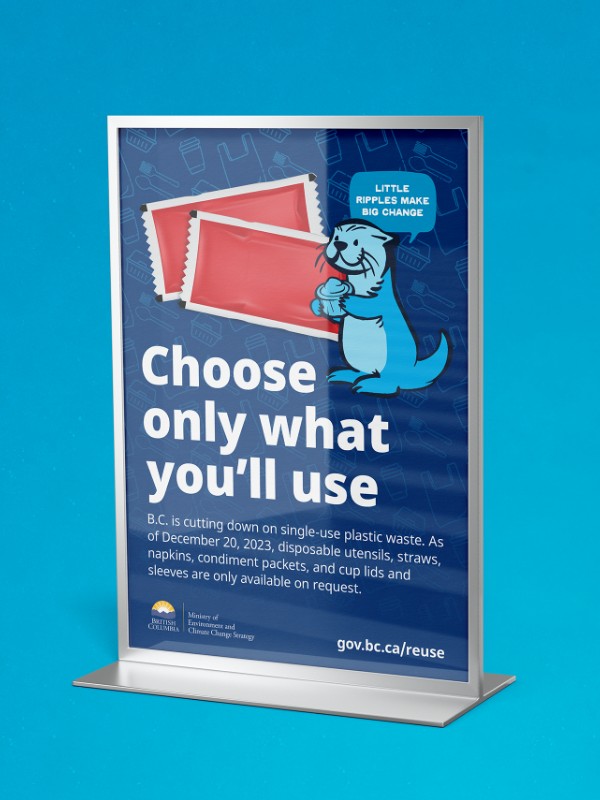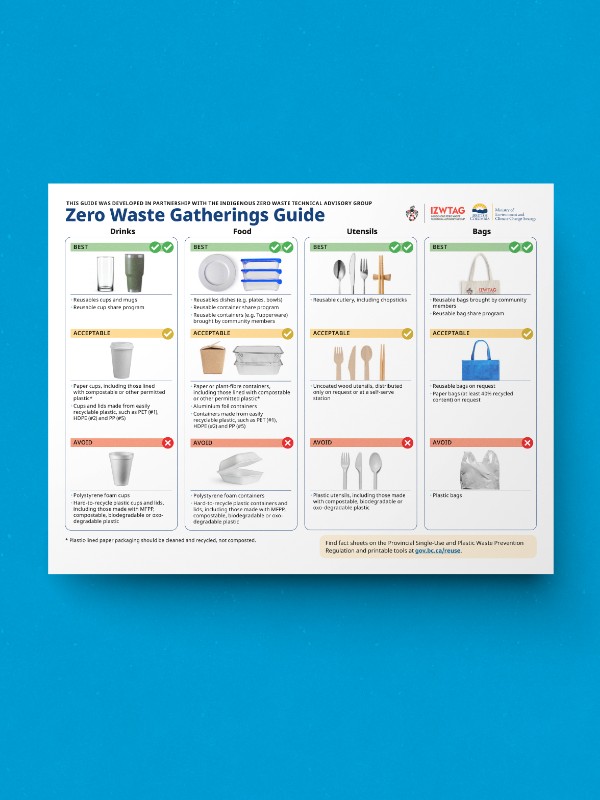Business resources for plastic regulations
B.C. is helping businesses understand the Single-Use and Plastic Waste Prevention Regulation. These resources will help businesses across the province understand and share the new regulations.
If you would like to find out when there are updates to this page, subscribe here
On this page
- Printable resources for businesses
- Indigenous language resources
- Alternatives to single-use items
- Changes for businesses
- Learn more
- Contact us
Printable resources for businesses
We're here to help you understand the regulation and communicate with your customers.
We've created a variety of materials to print, share and display:
- Facts sheets on each of the restricted items to build your understanding and share with staff
- Guides to help you switch to acceptable alternatives
- Posters, tent cards and shelf talkers to keep your customers informed
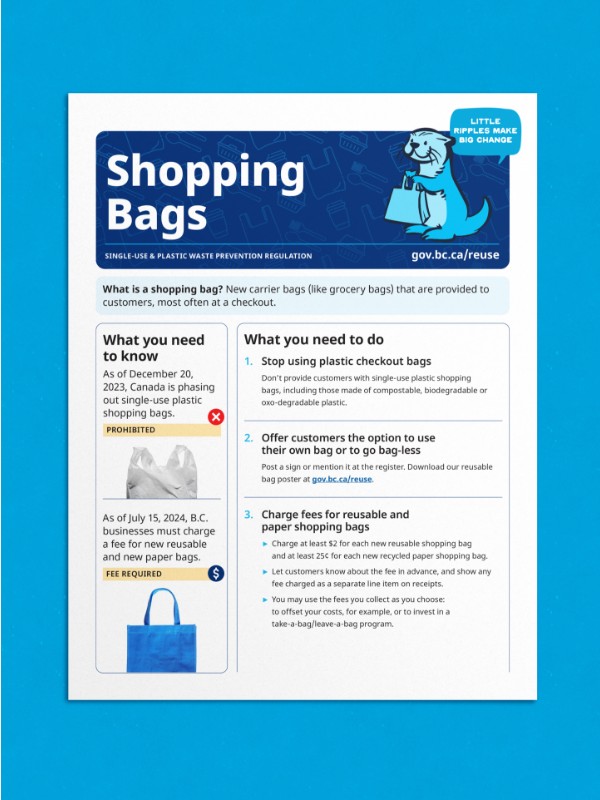
Fact sheets
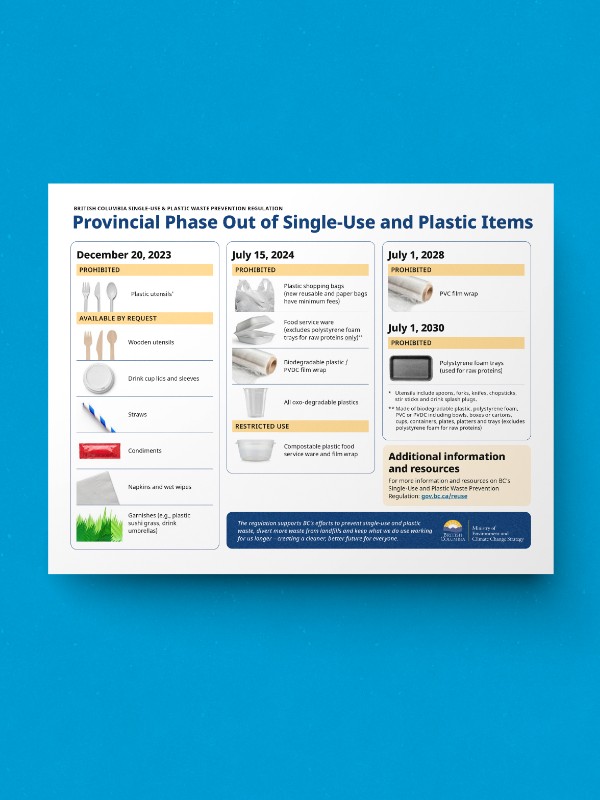
Guides
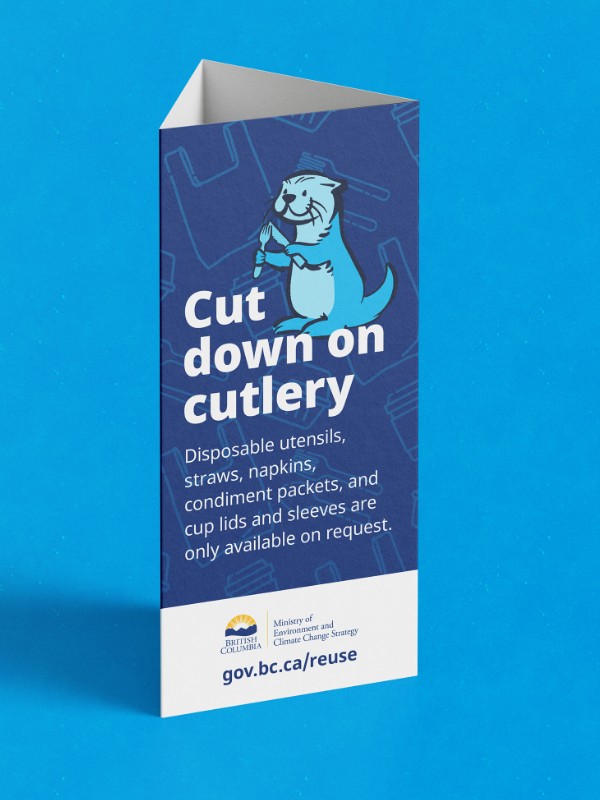
Tent Cards
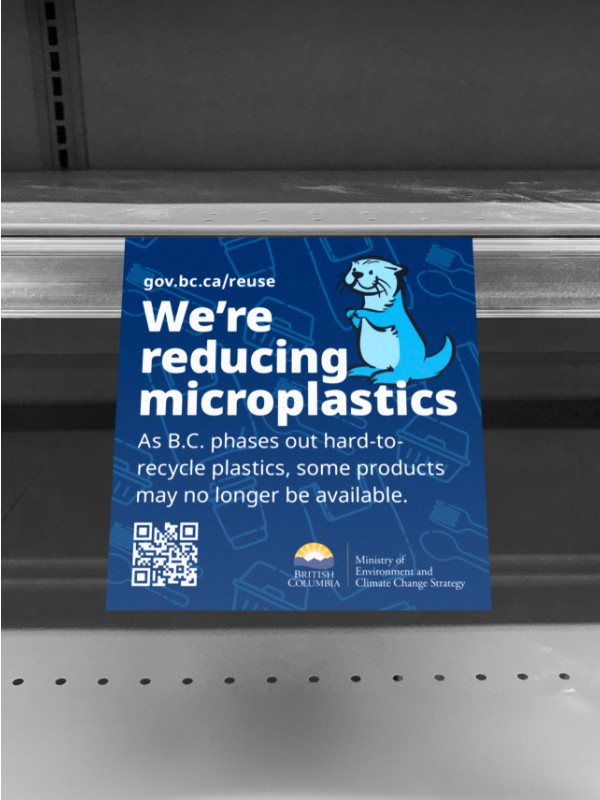
Shelf talkers
Shelf talkers are available to print and display if oxo-degradable items have been removed from your shelves due to the regulation:
Indigenous language resources
Explore and download community-developed Indigenous language resources created in partnership with First Nations and the Indigenous Zero Waste Technical Advisory Group.
Alternatives to single-use items
The best alternatives are reusable. Businesses are:
- Encouraged to provide reusable items or offer reusable cup and container programs
- Required to allow customers to bring their own reusable bags
The provincial policies for food safety in food premises ensure the health and safety of customers. This includes the Policy on the Use of Reusable Containers in Food Premises.
When reusables aren’t possible, single-use items made from paper, plant fibre or highly recyclable plastics are acceptable.
- Highly recyclable plastics include PET [#1], HDPE [#2] and PP [#5]
Learn more in our Alternatives to single-use plastics guide (PDF, 336KB).
Changes for businesses
Under the Single-Use and Plastic Waste Prevention Regulation, the sale and distribution of certain single-use items will be restricted. Learn about changes for businesses and find answers to some common questions.
All businesses that sell and distribute single-use items are impacted by the Single-Use and Plastic Waste Prevention Regulation. This includes food service providers, which are likely to see the most change.
Food service providers are businesses that prepare and serve food or beverages, as well as anyone who prepares food or beverages for people who aren’t members of their household. Food service providers include restaurants, food-truck operators, food vendors at farmers’ markets, caterers, delis, coffee shops and hotels, as well as schools, hospitals and other institutions that offer food service.
Shopping bags
Shopping bags, like checkout bags and grocery bags, are being banned. Most plastic shopping bags are designed to be used only a few times before becoming waste. In most cases, they are disposed of after only one use.
Requirements for distributing new shopping bags
Businesses distributing new shopping bags must:
- First offer the customer the opportunity to go without a bag or to use their own bag
- Customers can bring their own bags made of plastic or other materials
- Businesses can offer another way to transport goods, a take-a-bag, leave-a-bag program, or similar
If the customer asks for a bag after the sales transaction is complete a bag fee must still be charged.
Bag fees
Bag fees, in combination with bans, are intended to reduce waste by encouraging the use of reusable items. Fees only apply to shopping bags (like grocery bags) that are typically provided to customers at checkout.
The minimum fee level has been set to encourage the move away from single-use shopping bags to more durable, reusable shopping bags. Customers can avoid fees can by bringing their own bag.
Bag fees are retained by businesses.
Bags out of scope of the regulation that do not require fees
- Examples include:
- Bulk food bags (such as fruit, vegetables, nuts and candy)
- Small hardware items (such as nails and bolts)
- Temperature-sensitive items
- Prepared foods and loose bakery goods
- Linens, bedding and other similar, large items
- Clothes that have been professionally laundered or dry cleaned
- Sleeves for liquor bottles
- Reusable bags that are designed for use beyond that of a regular shopping bag, such as handbags, backpacks, gift bags, and leather, jute or canvas tote bags
- Plastic bags (not shopping bags) that are intended for home use, such as sandwich bags, garbage can liners and compost bin liners
Grocery delivery bag fees
Bag fees must be charged for all new recycled-paper and new reusable shopping bags used for grocery delivery.
Take-out order bag fees
Bag fees must be charged for all new recycled-paper and new reusable shopping bags used for take-out orders. Fees are not required on recycled-paper bags used for drive-through and prepared food delivery orders.
Societies and Registered Charities
Societies and registered charities do not need to charge fees on recycled-paper bags, reusable bags, or used bags used to provide food, beverages or personal hygiene products.
Food service accessories
Food service providers can no longer offer single-use (disposable) plastic utensils. Food service providers can only provide other disposable items, like wooden spoons, on request. While plastic utensils may be reused, they’re typically not designed for multiple uses. In most cases, they’re disposed of after only one use. The by-request requirement:
- Encourages customers to take only what they need and to use reusable options when available
- Ensures that items such as straws are still available for those who need them
Bundled utensils and accessories
Single-use accessories and utensils cannot be bundled. Bundling does not allow customers to take only what they need.
- A bundle is two or more single-use food service accessories provided together, whether packaged or loose. This may include, for example, a fork and knife, a napkin and straw, or chopsticks and a soy sauce packet
Wooden items
If a reusable product isn’t available, uncoated wooden accessories can be provided on request.
Lids
There are no restrictions on what materials lids can be made of. The best choices for single-use lids, however, are made of plant fibre or recyclable plastic (such as PET [#1], HDPE [#2] or PP [#5]).
Straws
Plastic straws are generally prohibited federally. Straws that are acceptable under the federal regulation can be provided on request in B.C.
- See the Fact sheet: Exceptions for single-use plastic flexible straws at Canada.ca to find out what straws are acceptable under the regulation
Garnish
A garnish is a single-use, inedible food service item that is often decorative, such as sushi grass or a cocktail umbrella. It is considered a food service accessory.
Room service
Hotel room service is considered a delivery service and must follow the same requirements as food service providers. Bundled single-use items cannot be provided. Ideally, reusable cutlery should be provided in hotel rooms.
Food service ware
There are restrictions to the types of food service ware that businesses can use. Disposable take-out containers and packaging are often made with hard-to-recycle materials. In most cases, these items are disposed of after one use.
Compostable plastics
Compostable plastics, including items labeled as compostable plastic, are not currently allowed to be composted in B.C. Until these products can be easily composted at B.C.'s composting facilities, we are encouraging the use of reusable items.
Food service ware that is lined with compostable plastic or polyethylene
Paper and fibre-based food service ware lined with compostable plastic or polyethylene can still be used. These items, once cleaned, can be recycled (but not composted) in B.C.
PVC film wrap alternatives
Film wraps made from polyethylene (PE) and other non-PVC plastics are permitted as an alternative for polyvinyl chloride (PVC) films.
Back of house use of single-use food service ware
Businesses may continue to use single-use items, such as PVC film wrap, if they are not used to package prepared food or drinks that will be distributed or sold to customers. However, under the federal Single-use Plastics Prohibition Regulation, some of these items will no longer be sold in Canada.
Mineral-filled polypropylene (MFPP)
MFPP is an emerging material for food service ware. MFPP is not currently banned under the regulation but it is not considered to be a good alternative.
- MFPP can't be recycled in B.C.
Learn more
- Learn out about single use plastic federal and municipal regulations that may impact your business
- Find out how to report violations of the regulation
Subscribe
Enter your email address to subscribe to updates of this page.

